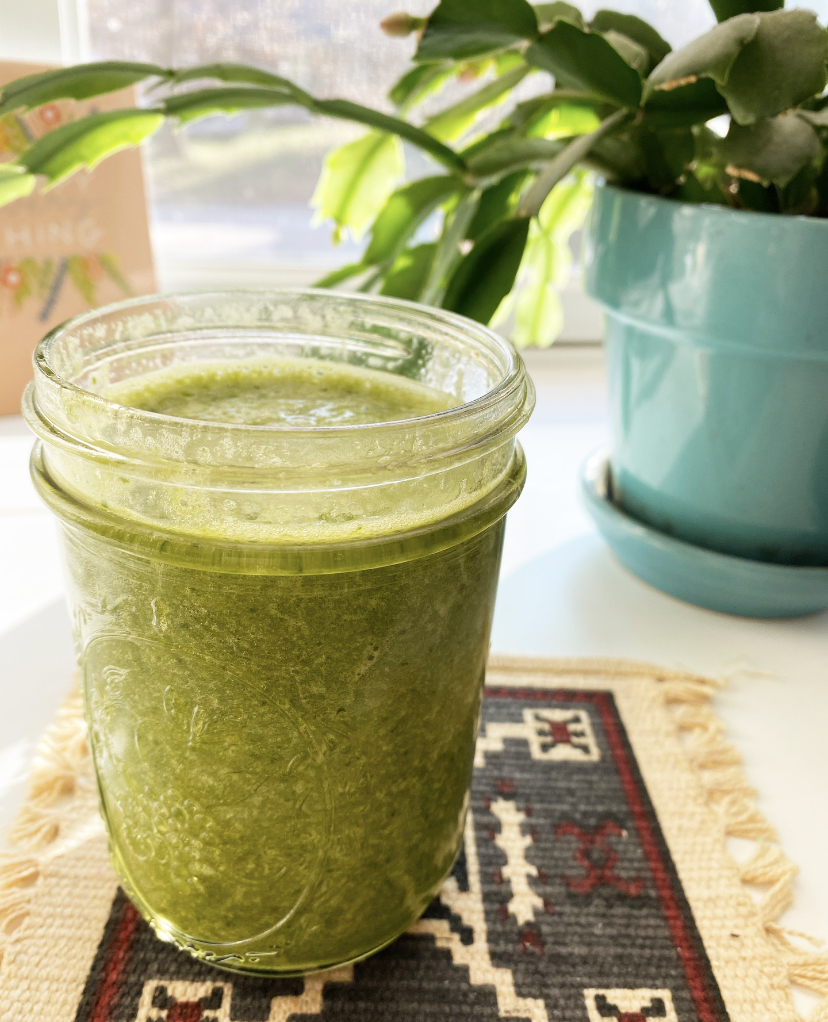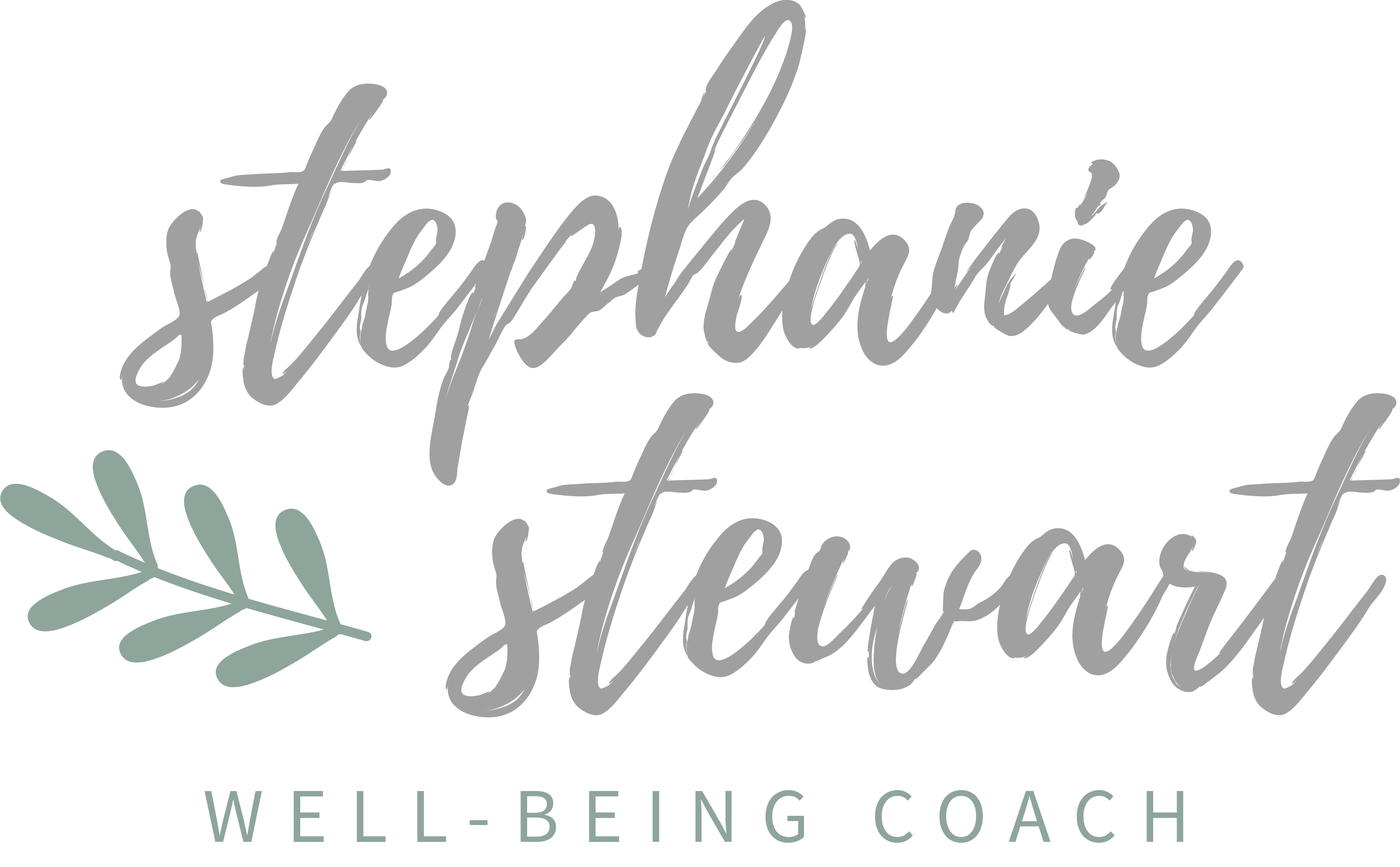
Drink Your Greens… Happily
I have found that it is much easier to stay the course when I have started the day right than it is to course correct mid way through. Anyone else? You know those mornings when you keep hitting snooze, sleep your way right up until the last possible second and the day starts with you feeling rushed and chaotic? It sets the tone for the day. The same is true for what we put in our bodies first thing. The below recipe will help you to drink your greens, happily.
This is my favorite drink to make in the morning all year round. It is packed with goodness, lots of vitamin C, and promotes kidney and liver cleansing as well as hydration. I call it Happy Green Drink because it makes me feel, well, happy! Drink up!
Happy Green Drink
1 Ripe Banana
2 Oranges, peeled
1 half lemon, peeled
Several big handfuls of spinach
1 teaspoon of fresh ginger, I use the frozen ginger cubes from Trader Joe’s
1 Tablespoon of agave or maple syrup
6-10 ounces of water
Handful of ice
Put all of this into a high speed blender. The trick is to blend it for several minutes. The longer you blend it, the more all the pulpy stuff from the oranges and lemon get broken down.
This recipe makes two servings. Now go drink your greens happily!
More happiness awaits
Starting your day in a positive way will certainly help you to continue on that trajectory. In order to be happy we need to take care of all three aspects of our being – our bodies, thoughts, and souls. This happy green drink certainly helps with the body. For more on how to care for the other aspects of your being, click here.
<3 Stephanie
Learn More

Cooking Up Happiness in Times of Stress
We are living in a time that is, not only uncertain, but volatile. For many, happiness during times of stress seems unattainable. This can bring about feelings of fatigue due to interrupted sleep. Lack of sleep and exhaustion leads to irritability. This leads to self deprecation because perhaps you’ve lashed out at someone you love. Emotional outbursts of anger, fear, and sadness cause us to feel out of control. In an attempt to regain control we sometimes retreat from others, further disconnecting ourselves. Isolation paves the way for depression and anxiety. This happens to varying degrees in all of us and none of it feels good.The good news is, we can learn to recognize what is going on and cook up happiness for ourselves, even during times of stress. It’s true. As a coach, I work with my clients in discovering what makes them happy. We also do work on understanding what makes them unhappy. In doing this, my clients develop a better relationship with themselves and are able to enjoy the feeling of happiness more often. Fill out the contact form to learn more about coaching and how it can help you unblock your well-being. Today, I am going to give you some tools you can begin practicing on your own to cultivate more of these good feelings.

Spend Time in Nature
Being outdoors gets you out of your head and opens up your senses. Have you ever felt overwhelmed or stressed and suddenly had the urge to go outside and take a deep breath? Just breathing different air can provide relief. Spending time in nature serves as a good reminder that, as humans, we are one part of a much larger whole. This is a relief because we can see it isn’t all about us. Next time you are feeling isolated or overwhelmed, give this a try.
Step outside and either sit comfortably or begin walking. If you choose to walk, keep your pace slow and leisurely. Focus on all that you see, without being narrow in your vision. With a wide gaze, notice the colors, shapes, foliage, flowers, sky, trees, etc. Take deep breaths in through your nose and out through your mouth. What do you smell? Take in the sounds around you. Birds chirping, leaves crunching, water rushing. Appreciate these sounds like you would with beautiful music. What do you taste? Finally, what do you feel? You can touch the grass, or the bark of a tree nearby, or simply feel the breeze on your skin.
In connecting with nature, you are connecting deeper with yourself. It is calming and can be meditative if you are open to it. When we are calm, we are able to see more clearly and make better choices for ourselves and ultimately, find happiness during times of stress.
Eat healthy, nourishing food
This is a tricky one for many people. It is common to soothe sadness, anger, and fear with food that is high in sugar and fat. It tastes really good going in, but for most people the physical discomfort that comes later leads to regret. Why does this happen? The short answer is we are looking to increase pleasure. Eating food like this gives a temporary feeling of fulfillment that wears off leaving us feeling cloudy, bloated, etc. I don’t know about you, but I don’t like that feeling.
I have found that the best way to avoid the downward spiral that indulging in two pieces of cake will certainly bring is to be prepared. This requires a little bit of planning and some time. Make a list of healthy things you enjoy eating. Fruits, veggies, nuts, etc. It’s always a good idea to have these things ready for consumption when the urge to snack strikes. This will help you cultivate healthier eating by giving you ready made options within reach.
But we all know these things will not satisfy our sweet tooth. The last thing I want when I’m feeling bored or sad or frustrated is to crunch on a piece of celery. I want cake, but I know cake generally doesn’t make me feel good. So, to increase the probability of nutritional happiness during times of stress, I make protein bites and keep them in the freezer. They are sweet, loaded with goodness, and it’s hard to eat more than two. I make mine with dates, nut butter, coconut oil, nuts like walnuts or pecans, cinnamon, and mini chocolate chips. I have made enough protein bites that I adapt recipes on the fly and experiment. It’s kind of fun, actually. Eventually I will post some recipes on my site, but until then Minimalist Baker has some good ones you can try.
Work in the Service of Others
I love this one. Doing kind things for someone else feels so good. One of my favorite things to do is to pick a few flowers from my garden, write a little note, and deliver it for no reason in particular to a friends doorstep. Think about how you would feel if someone did that for you. Pretty great, right?
Doing acts of kindness for others is one way to increase loving feelings in your life and increase happiness in times of stress. It takes the focus off of yourself and puts it on someone else. This increases empathy and leaves you with a smile on your face. Even more, it creates feelings of deep satisfaction in the knowledge that your small kindness, more than likely, made a big difference in someone else’s day.
Here’s the catch. Sometimes the kindness we show to others goes unnoticed. It’s ok. That doesn’t take away from your feelings of satisfaction. You never know what is going on in someone else’s life at any given moment. Showing love and appreciation is always a good idea, even if the recipient can’t or doesn’t see what you are doing. So, give love and kindness freely and see what goodness comes for you in the process.
Show Gratitude
Beginning and ending each day with gratitude is a powerful thing. Writing these things down is even better. Taking time to express gratitude each day serves us a dose of happiness and appreciation for what we have. These include relationships we have, people we feel blessed to know, opportunities we enjoy, time we have, activities we love. The list is abundant and goes on forever. Having gratitude promotes abundance, which promotes happiness in times of stress.
Have you heard the saying: What we focus on grows? It’s absolutely true. When you focus on worry, what could go wrong, stress, and the like, that is what you have an abundance of. Contrarily, when you focus on what you appreciate, your blessings, and the goodness in your life, those grow exponentially. Writing it down solidifies these appreciations and when you are lacking, they serve as a reminder of all that you have. Keep a journal at your bedside for your gratitude lists. Having it handy will help you get into the habit of writing each day. Start with 5. Write down 5 things each morning and another 5 each night. Don’t overthink it. Write what comes to mind and gives you good feelings in those moments.
Smile More
Seriously. It’s that simple. Just smile. Smile at your family, smile at your neighbors, smile when you go to the store. Look at the people around you in the eyes and smile at them. Many have let that practice atrophy because we aren’t feeling so good. All the above practices for creating more happiness in times of stress will help you get to smile more, I promise.
Move Your Body with Intention
Living a sedentary lifestyle leads to feelings of malaise, low energy, depression, and even anxiety. These are all common complaints from most people I come into contact with. I know for myself, when I don’t move my body, I don’t feel good physically or mentally. There is a simple explanation for this. Humans were not designed to be sedentary. Our systems functionality depends on good nutrition, quality sleep, being adequately watered, and movement.
I hear people say they don’t like exercise. I understand. We often don’t like what makes us feel uncomfortable. Going to the gym or taking a group fitness class for some people is very anxiety producing. The thing is that exercise doesn’t have to be something you dread. There are so many ways to move your body. Here are a few suggestions that you can do anytime, alone or with others.
Get moving!
There is nothing quite like a spontaneous dance party to promote happiness in times of stress. Put on some music and dance around the house. Sing along, move and shake, smile — maybe even laugh! This gets your heart rate up, releases feel good hormones, and alleviates stress and tension. If you have younger kids, you are modeling so much good for them. You are giving yourself and them permission to feel joy. Invite them to dance along.
Take a walk. There is something really great about putting on some music or your favorite podcast and taking a good power walk. Breathe in through your nose and out through your mouth. Every now and then let out a sigh and feel the relief wash over you.
Go hiking. This requires a little more effort in that most people would have to drive to a trail first. More planning and more time, but very enjoyable. See the above on spending time in nature. A hiking trail is a wonderful place to spend a few moments in a mindful state becoming aware of your senses and then taking a nice walk through the woods.
Develop a morning and evening stretching routine. This alleviates tension, lubricates the joints, relieves muscle soreness, and just generally feels really good.
The suggestions I provided here are just scratching the surface. What are some activities you enjoy? How can you incorporate more movement in your daily life?
Get Quality Sleep
Sleep is something we all need and unfortunately, it eludes many. Insomnia is no fun and lack of sleep leads to many other issues, both physical and mental. There are things you can do today to start cultivating better sleep conditions for yourself. For instance, you can become aware of your technology use in the hours before bedtime, notice what you are eating and drinking, and the quality of your sleep environment. Before you decide what needs to change I would suggest collecting some data first.
Do your research
If you are using a gratitude journal and keeping it bedside, you can create a section in this notebook for sleep data. For one week, each night before bed, write down the following. The time you are getting into bed, what time you ate your last meal and what it was, what you drank including alcohol, tea, etc and how much you drank, what activities you did in the evening hours before bed, how you feel physically, and how you feel mentally. Each morning jot down the time you woke and how you felt upon waking. Did you wake in the night? If so, how many times and what time? Were you able to get back to sleep? How many hours did you sleep? Do you feel rested?
Begin to notice patterns and start to make some adjustments. Consider eliminating alcohol, limiting technology use two hours before bedtime, not utilizing television in the bedroom, and making nutritional adjustments if you are experiencing stomach discomfort.
Making changes requires you first to examine what is happening. This involves being honest about our habits and patterns and being willing to let go of those things that aren’t serving us long term, even if they feel good in the moment. Good sleep requires that we do this. So does our overall well-being. Working with me will give you the tools and accountability you need to create this awareness and make healthy changes. If you are ready to explore that more deeply, reach out to me here and we will get started!
Meditate
This will take some practice. And it may feel challenging to you at first, but I encourage you to keep trying. Sitting in stillness does much more for our mental health than most of us realize. We spend so much time going and doing and thinking and worrying and multitasking. In the process of all of that busyness we get lost. We become used to stuffing our feelings down, avoiding vulnerability, and growing further away from tapping into our intuition. In other words, we are living on autopilot. Living in this way is keeping us from living well and living happy. In order to be happy we need to know what really makes us happy. In order to know what makes us happy, we have to listen.
Listening requires being attentive. It also requires putting aside our judgments. This is meditation. It is calming the body, quieting the chatter in our thoughts, and listening to our intuition. Some enjoy guided meditation to get started. You can find apps for that if you like. I have found that to be distracting. So, I suggest trying something more simple.
Simply get started
Sit comfortably in a chair with your feet on the floor. Relax your body without slouching or becoming too rigid. Allow yourself a few moments for adjustment and then ask yourself to begin noticing the urge to adjust and letting it go. Bring your awareness to your breath. Breathe in through your nose and out through your mouth, with your lips slighting parted. Your breath should be easy and effortless. Your mind will be wandering and that is ok. As you breathe, notice the thoughts that are active in your mind and allow them to float on by like clouds. This will give you some relief in knowing that your thoughts are normal and there is no need to fight them or push them down and away. Let them be what they are and avoid attaching to them. When you struggle with this, bring your awareness back to your breath.
Start with a few minutes and then begin adding time each time you attempt to meditate. As little as 3 minutes can make a difference in your mental and physical self. Give yourself time to adjust to this new practice and celebrate each moment you spend trying. Before long you will be able to dive deeper into your practice both in length of time and quality of how you feel during and after you meditate. I will wager that you will rise from your practice of meditation feeling a sense of happiness in times of stress.
Happier You
By choosing to explore a few or all of these options, I have no doubt that you will see an increase in your overall well-being. You deserve to feel and be happy. Finding happiness in times of stress is especially important because it promotes resilience. It provides a sense of hope. Satisfaction comes from within and only when we are happy with ourselves can we really radiate happiness out to others. It’s a beautiful thing. Take good care of yourself and you will be in a better position to show care for others.
<3
Stephanie
Learn More
